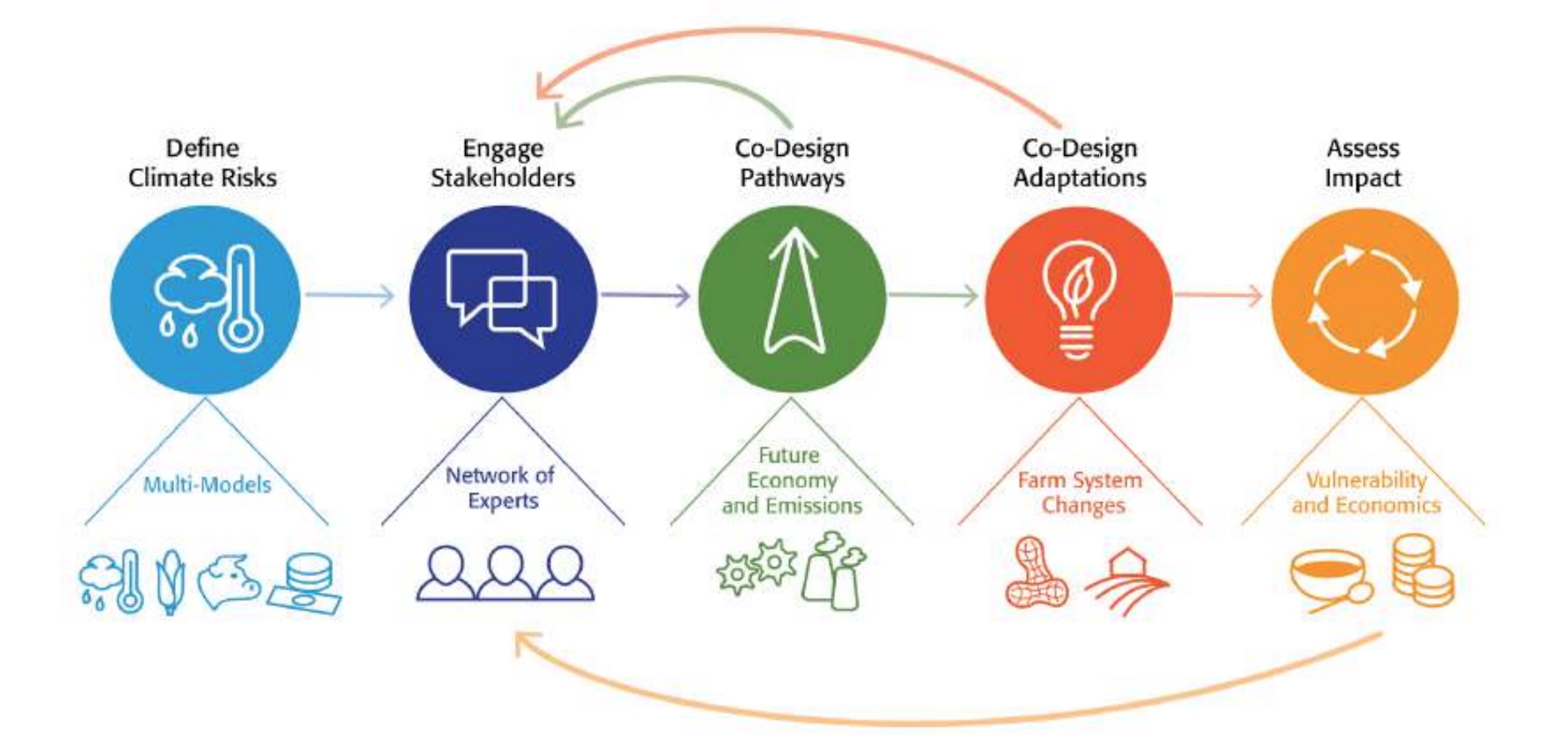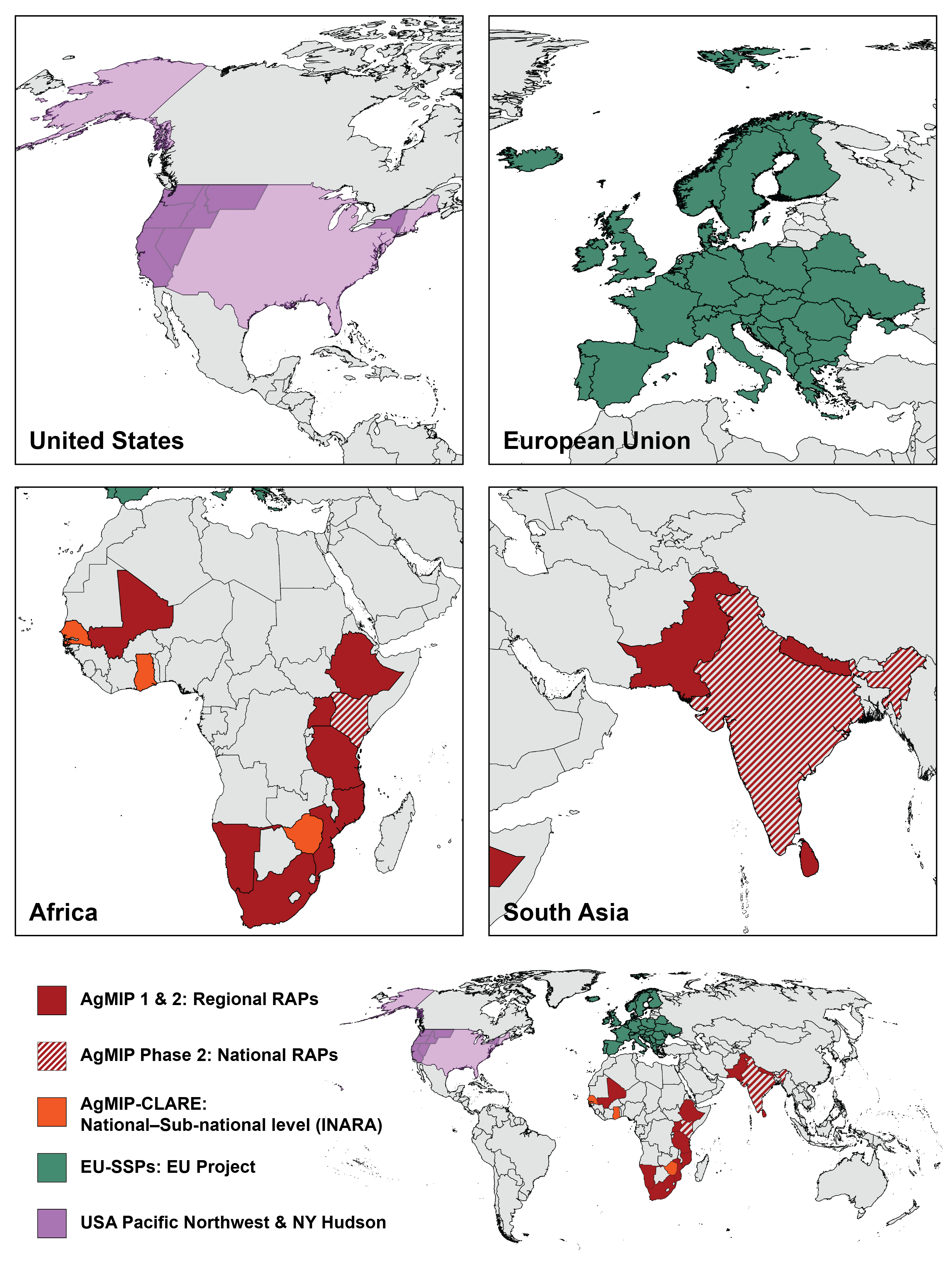AgMIP’s Foresight: Representative Agricultural Pathways (RAPs)
Main Contacts for Initiative
Roberto Valdivia (Oregon State University, USA) and John Antle (Oregon State University, USA).
Description
Foresight methods play a crucial role in preparing for an uncertain future and addressing the complex challenges facing agriculture and food systems. Agricultural development pathways, combined with farming systems modeling, can provide insights into the likely impacts of climate change, adaptation, and mitigation within the context of existing agricultural and climate policies, as well as how these policies influence climate change responses. AgMIP’s Representative Agricultural Pathways (RAPs) offer both qualitative and quantitative information to characterize the future conditions under which specific farming systems might operate (Valdivia et al., 2015, 2021).
RAPs are co-designed with stakeholders and other key actors, fostering collaboration between science and policy development. This process helps set priorities and identify the investments, institutional mechanisms, and capacities needed to support an envisioned future while acknowledging inherent uncertainties.
Simulation experiments using RAPs enable the evaluation of potential policy decisions, adaptation strategies, and mitigation measures by comparing short-, mid-, and long-term outcomes at local and national scales. These experiments provide critical insights for designing policies that align with sustainable development goals (SDGs) and support adaptation objectives such as National Adaptation Plans (NAPs) and Nationally Determined Contributions (NDCs).

Figure 1. AgMIP’s participatory approach to co-develop agricultural pathways and adaptation strategies.
RAPs are an integral component of AgMIP’s Regional Integrated Assessment (RIA) method for evaluating agricultural systems, climate change, adaptation, and mitigation (Antle et al., 2015; Valdivia et al, 2015). RAPs enable a simulation framework with consistent assumptions about climate, economics, and other factors across various scales. This framework informs actionable climate change adaptation and mitigation strategies tailored to regions with similar biophysical and socio-economic conditions, addressing plausible futures that cannot be explored through traditional field experiments.
Research outputs from co-development of RAPs implemented in different countries include (Homann-Kee Tui et al., 2022):
1. Pathways for agricultural development, validated with stakeholders and experts, represent the impacts of climate and other socio-economic influences, as well as the likely effects of policy changes on agriculture and the broader food systems.
2. Consolidating policy packages for sustainable and resilient agri-food systems, including their costs, feasibility, and impacts, supports desirable transitions based on thorough policy analysis and clear requirements.
3. Actionable information on implementing pathways at different scales, including where transitions should start, target destinations, and alignment with context-specific priorities and entry points, guides effective decision-making.
4. Analyses of the potential consequences of plausible pathways, including scenarios where agricultural sustainability is not prioritized or policies are only partially implemented, highlight the risks and challenges of inaction or misalignment.
Science can thereby support countries to decide and plan climate change actions based on a sound understanding of vulnerability and growth potential and prepare for adaptation with links to other sectors.
AgMIP’s Foresight research supports countries in planning climate actions by providing a clear understanding of vulnerabilities and growth potential. Through scenario analysis and forward-looking strategies, it links climate adaptation and mitigation to other sectors, enabling more resilient and informed decision-making for sustainable development
AgMIP is committed to developing RAPs in partnership with local stakeholders to address the evolving conditions for farm-level management options and country/regional-level economic policies over the 21st century. AgMIP RAPs will facilitate an important assessment of the scale-dependent and intertwining roles of climate change, economic development, and adaptation in the agricultural sector. It is also our hope that AgMIP RAPs will act to standardize agricultural model simulations of future conditions for research projects in the coming years, allowing independent researchers to directly compare their results and build the transdisciplinary community of agricultural modeling.

Figure 2. Adapted from Valdivia et al., 2015.

Figure 3. AgMIP’s RAPs around the world.
References
Antle, John, Roberto O. Valdivia, Ken Boote, Jerry Hatfield, Sander Janssen, Jim Jones, Cheryl Porter, Cynthia Rosenzweig, Alex Ruane, and Peter Thorburn. 2015. AgMIP’s Trans-disciplinary Approach to Regional Integrated Assessment of Climate Impact, Vulnerability and Adaptation of Agricultural Systems. In Handbook of Climate Change and Agroecosystems: The Agricultural Model Intercomparison and Improvement Project (AgMIP). C. Rosenzweig, and D. Hillel, Eds., ICP Series on Climate Change Impacts, Adaptation, and Mitigation Vol. 3. Imperial College Press, doi:10.1142/9781783265640_0002.
Homann-Kee Tui, S., Sisito, G., Moyo, E. N., Dube, T., Valdivia, R. O., Madajewicz, M., Descheemaeker, K., Ruane, A. C. (2022). Developing Pathways for Sustainable Agricultural Development in Zimbabwe by 2030 (pp. 185–202). In: Climate Change Adaptations in Dryland Agriculture in Semi-Arid Areas. DOI : 10.1007/978-981-16-7861-5. Springer, Singapore.
Valdivia R.O., Antle, J.; Homann-Kee Tui, S., Subash, N., Hathie, I., Neduraman, S., Harbir, S., Çlaessens, L., Dickson, C., Sisito, G. 2021. Developing Representative Agricultural Pathways: A Multi-Scale Co-Designing Process to Support Transformation and Resilience of Agricultural Farming Systems. In: Handbook of Climate Change and Agroecosystems: Climate Change and Farming System Planning in Africa and South Asia: AgMIP Stakeholder-driven Research (In 2 Parts) (Vol. 5). World Scientific Publishing. [Rosenzweig, C., C.Z. Mutter and E. Mencos Contreras (eds.)]. June 2021
Valdivia, Roberto O., John M. Antle, Cynthia Rosenzweig, Alex C. Ruane, Joost Vervoort, Muhammad Ashfaq, Ibrahima Hathie, Sabine Homann-Kee Tui, Richard Mulwa, Charles Nhemachena, Paramasivam Ponnusamy, Herath Rasnayaka, Harbir Singh. 2015. Representative Agricultural Pathways and Scenarios for Regional Integrated Assessment of Climate Change Impact, Vulnerability and Adaptation. In Handbook of Climate Change and Agroecosystems: The Agricultural Model Intercomparison and Improvement Project (AgMIP). C. Rosenzweig, and D. Hillel, Eds., ICP Series on Climate Change Impacts, Adaptation, and Mitigation Vol. 3. Imperial College Press, 101-156, doi:10.1142/9781783265640_0005.
